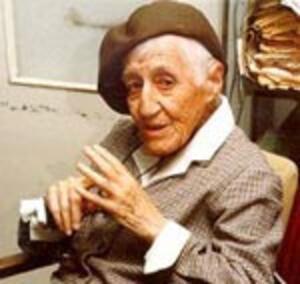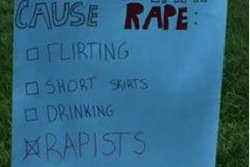We Should All Be Feminists
Nehama Leibowitz, one of the greatest Torah scholars of the twentieth century, was often described as a paradoxical woman. She was a pious Jew, and a liberal. She was fiercely intelligent, and nonetheless humble. She was a Torah scholar and teacher of thousands, and she was a woman.
I have always understood myself to be living a sort of paradoxical life. I’m a Conservative Jew with a fervent belief in egalitarianism, religiously and otherwise. I’m a religious Jew with a love of Torah study and keeping Shabbat each week. This lifestyle is one that can often lead me to feel, to quote my mother, like the “lonely woman of faith.” To my left, people find my ideas ridiculous, fanatical, and altogether unreasonable. To my right, I’m a radical man-hating liberal. I can’t win. It is on this level that I connect with Nehama the most. The impossible fervent belief in Judaism entangled in a mess of liberalism that is my day-to-day life was, to some extent, Nehama’s life as well.
There is one aspect of Nehama, as she humbly liked to be called, that I cannot seem to wrap my head around. She was an ardent anti-feminist. Her study and teaching was a breakthrough in many ways for women in the religious intellectual world, but she refused to in any way identify with feminist movements of the time. It didn’t matter how many people she inspired in the study of the bible. It didn’t matter how many times she came up with entirely original interpretations and connections in the text. There were many people for whom what mattered was that she was a woman, an unfortunate barrier she’d never be able to overcome. And yet Nehama rejected feminism.
Maybe it was generational. Maybe she genuinely believed there wasn’t a gap between the genders, but that men and women simply had different roles to play. To me it doesn’t seem fair for her to have used her success as a blindfold to ignore the perils of other, less successful woman, but her charitable persona would suggest that this wasn’t her intention. Maybe she was aware of the differences in position of men and women in society and found nothing wrong with them. Maybe, and this I think is most likely, she avoided the feminist label because she wanted to protect herself from criticism, and to just be known as a teacher and a scholar.
To me, that’s unfair. There are women in this world who cannot drive because of their gender, and there are women in this country earning 77 cents to a man’s dollar. Girls and boys, we need to be feminists. There is no other option that doesn’t put society entirely in reverse. Denying problems doesn’t make them go away, it only extends the reach of their impact. We must be constantly conscious of injustices of all sizes, and we must act accordingly. Discrimination based on gender is absolutely no exception.
I don’t mean that everyone has to be an activist. Although feminist activism has been a formative part of my own adolescence, I know that this can’t be true for everyone. What I do mean is that we need to stop the name calling, the stereotyping, and the ignorance surrounding the concept of feminism; we need to begin to realize that to believe in human rights is to be a feminist.
Nehama’s skill and talent opened doors for her that were kept shut for many other women. As I learn from her teachings, I know that without her contributions, Torah study could not be what it is today. I will keep studying from her world-renowned commentaries with the awareness that her work was a breakthrough for women everywhere, whether she liked to admit it or not.
I won’t ever stop believing that fixing the problems of gender inequality in this country and around the world must begin by acknowledging the basic existence of such issues. Nehama’s actions fought for the feminist cause even if she wouldn’t.
I now call on you. I hope that you’ll reevaluate this powerful term, and the even more powerful movement. Hopefully, you will struggle with its history and its future, and ideally, its present—you. Welcome to the dark side. We have cookies.
This piece was written as part of JWA’s Rising Voices Fellowship.







